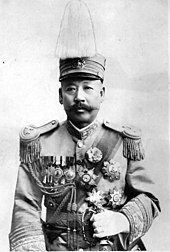Cao Kun
Cao Kun ( 曹 锟 , adult name Zhongshan 仲 珊 ; * December 12, 1862 in Tianjin ; † June 4, 1938 ibid) was a Chinese warlord , President of the Republic of China , leader of the Zhili clique in the Beiyang Army and trustee of the Catholic Peking University (predecessor of Fu Jen Catholic University ).
Cao was born into a poor family in Tianjin. In 1894, during the First Sino-Japanese War , he was recruited into the army to fight at Choson . After the war, he joined the Beiyang army of Yuan Shikai , who sponsored his rise. At the time of the Xinhai Revolution of 1911, he was promoted to division commander.
After Feng Guozhang's death in 1919, he became the leader of the Zhili clique. During the 1918 election, Duan Qirui had promised him the vice-presidency if he was elected. However, the elected National Assembly did not have a quorum in the vote, which is why no vice-president was elected. Cao Kun felt betrayed by Duan and defeated him in battle in 1920.
He pushed through the resignation of Presidents Xu Shichang and Li Yuanhong and later ran for office himself. It was reported that he helped his presidential candidacy to win by paying 5,000 pieces of silver for each MP's vote. He held the office from October 10, 1923 to November 2, 1924, as there was no quorum parliament to elect him.
As one of his first acts as president, he proclaimed the entry into force of a progressive Chinese constitution on October 10, 1923, which remained ineffective. In October 1924, during a war against Zhang Zuolin , Feng Yuxiang launched a coup d'état against Cao Kun, occupied Beijing , forced him to resign and arrested him. His brother, Cao Rui, was placed under house arrest and committed suicide .
After two years of arrest, Cao Kun was released by Feng Yuxiang as a gesture of goodwill to Wu Peifu .
Individual evidence
- ↑ It was reported that he won the election by bribing Members to the extent of "5,000 pieces of silver" each. according to Time n ° 12, October 12, 1923, Page 12, Briton Hadden, Henry Robinson Luce - 1923 Thomas A. DeLong, Madame Chiang Kai-shek and Miss Emma Mills: China's First Lady, p. 58
| personal data | |
|---|---|
| SURNAME | Cao Kun |
| ALTERNATIVE NAMES | Tsao Kun |
| BRIEF DESCRIPTION | Chinese warlord and president |
| DATE OF BIRTH | December 12, 1862 |
| PLACE OF BIRTH | Tianjin |
| DATE OF DEATH | June 4, 1938 |
| Place of death | Tianjin |

